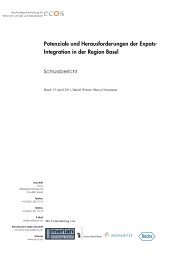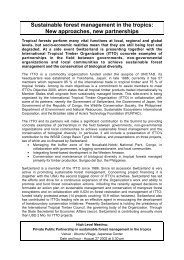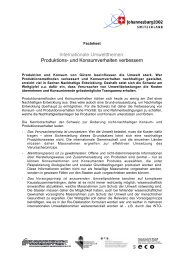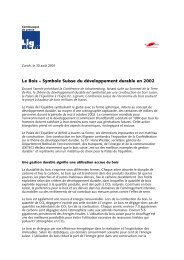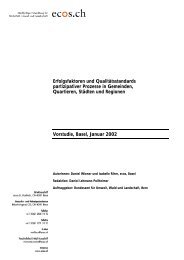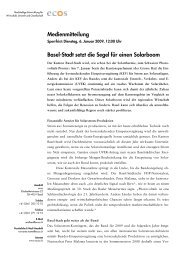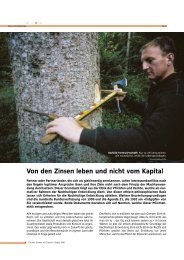Extract from the Position Paper
Extract from the Position Paper
Extract from the Position Paper
You also want an ePaper? Increase the reach of your titles
YUMPU automatically turns print PDFs into web optimized ePapers that Google loves.
WSSD 2002 - 9 -<strong>Position</strong>en der Schweiz Erarbeitungsstand 22. März 2002c) Political support, legislation and administrative instrumentsBasic political decisions and laws can provide frameworks that have a decisive influence infostering sustainable development in mountain regions.Switzerland supports political processes of negotiation as well as legal frameworks (such asnational policies on mountain regions or spatial development policies) and laws (e.g. to promoteinvestment) that would help to streng<strong>the</strong>n <strong>the</strong> political and economic power of mountain regions ina national context. Switzerland is also committed to adequate implementation, for instance byassisting in institution building to promote <strong>the</strong>se measures.Switzerland believes that <strong>the</strong> development and implementation of new forms of politicalparticipation at <strong>the</strong> community level are especially important. This should include decentralisation,transparency, and more active involvement by people at <strong>the</strong> local level.d) Institutional capacity, education and trainingInstitutional capacity and human capital are <strong>the</strong> core elements of development in resource-poorareas such as mountain regions.Switzerland continues to support institutions concerned with international mountain development(specific international and regional organisations, development cooperation projects, and mountainpartnerships in <strong>the</strong> framework of <strong>the</strong> National Centre of Competence in Research North-South and<strong>the</strong> Swiss National Research Programme on Landscape and Habitats in <strong>the</strong> Alps). Switzerlandalso calls upon o<strong>the</strong>r countries to become more active in supporting such institutions.Toge<strong>the</strong>r with like-minded partners, Switzerland strives to develop and support institutions in <strong>the</strong>mountains such as universities and vocational schools that engage in research, teaching andabove all implementation of innovations adapted to mountain regions. Support for boarding schoolsthat have an international reputation, such as those that have long existed in Switzerland, is afur<strong>the</strong>r option.e) Information systems and exchange of information on mountain issuesSwitzerland supports exchanges of information on mountain issues at <strong>the</strong> regional, national andinternational levels concerned with policy, administration and economic issues as well as scienceand technology. It encourages both institutions and individuals in <strong>the</strong>se areas to make <strong>the</strong>irexperience accessible and supports <strong>the</strong>m in <strong>the</strong>ir efforts to do this. Switzerland also supportsinstitutions that are capable of coordinating <strong>the</strong>se exchanges of experience and compiling globallycoordinated databanks on mountain-related topics, such as <strong>the</strong> glacier inventory which providesdata that give early warning about negative environmental trends at <strong>the</strong> global level.f) Involving <strong>the</strong> private sector in mountain developmentImportant stakeholders such as <strong>the</strong> business community (trade, industry, mining, hydroelectricity,mass tourism and additional services such as banking and credit services) are rarely if everrepresented in existing (international) networks concerned with mountain issues.Switzerland would welcome <strong>the</strong> opportunity to join like-minded partners at <strong>the</strong> international andregional levels in encouraging initiatives that are open to <strong>the</strong>se stakeholders, make <strong>the</strong>m aware ofmountain development issues, and mobilise <strong>the</strong>ir support. Local and regional business forums andcouncils such as a World Business Council for Sustainable Mountain Development, in which <strong>the</strong>tourist industry and o<strong>the</strong>r financially influential sectors of <strong>the</strong> business community could take part,




